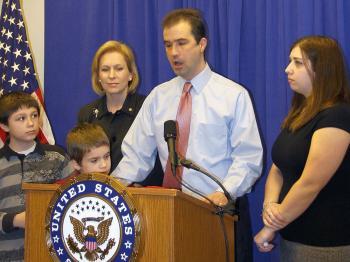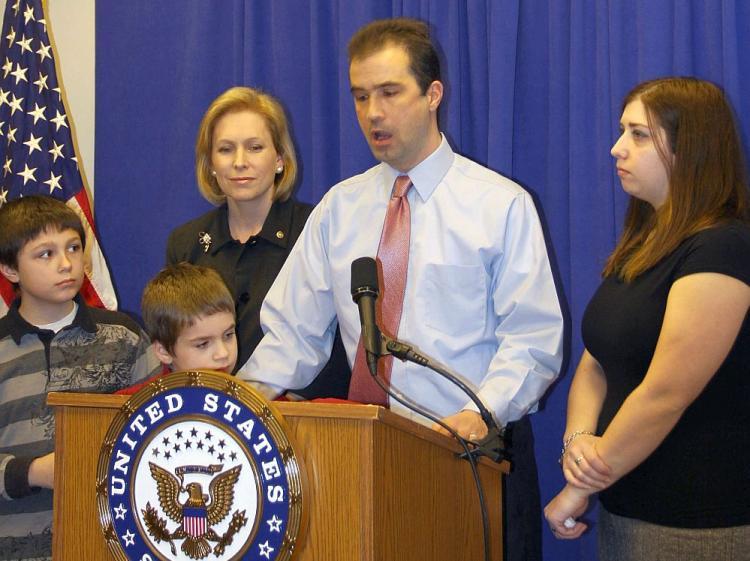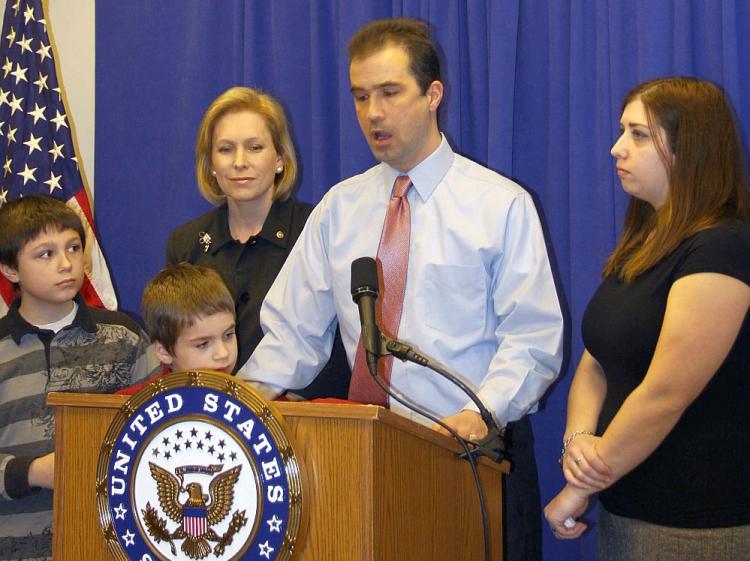NEW YORK—As many clamber to get a helping of the thinly sliced budget pie, Sen. Kirsten Gillibrand (D-N.Y.) wants to give New York’s middle class $1 billion in property tax funds.
Gillibrand announced Sunday the first piece of legislation that she plans to introduce to Congress: the Homeowner Tax Fairness Act. The act would allow anyone who pays property tax to claim the full amount paid. Currently, the claim is capped at $500, and only those who itemize their tax deductions can deduct property tax.
This bill would primarily affect the middle class, because they are the least-likely homeowners to itemize. Only one-third of middle-income New Yorkers itemize, and usually only those with an income of $100,000 or more do so, Gillibrand said.
“For all tax issues and all spending issues, it’s always about priorities,” said the senator. “So, my focus is on who needs the tax deductions, who needs the tax cuts the most. It’s middle-class families.”
In a state with the highest taxes in the nation, Gillibrand feels the annual property tax hikes in New York require relief. In 2010, property taxes increased by 4.9 percent for single-family homes in New York City and by 3.5 percent for condo owners, on average.
On Staten Island, John Lavelle’s property taxes went up by 6 percent. He and his wife Amy work for local nonprofit organizations. They have two children: Zachary, 8, who suffers from autism, and Jacob, 12. The family appeared with Gillibrand on Sunday to support her legislation.
“Raising two kids in the city of New York is not easy. Our water bill is going up, the bridge tolls are going up, [and] property taxes are going up every year. We feel like we’re getting nickled and dimed and squeezed at every turn,” Lavelle said.
Gillibrand says the Homeowner Tax Fairness Act would save 1.1 million New York state homeowners who do not itemize their tax deductions a total of $1 billion annually; this would include $210 million in savings for the 300,000 homeowners in New York City. Families with annual income of $90,000 would save about $758 a year, and those who bring in $68,000 would save about $500.
Lavelle outlined what the extra $500 could mean for his family: “For us, it could be groceries for a month, it could be lessons for Jacob, or the tools that I have to buy for Zachary. Whatever it is, it’s going to go a long way to help us.”
When asked if he could itemize, Lavelle attempted an answer, but stopped short, saying, “Ask my accountant.” Whether or not more middle-class homeowners could itemize, Gillibrand says the point is that they don’t.
While governments at all levels flounder to provide services and tighten purse strings at the same time, every concession must be weighed carefully. Gillibrand repeated suggestions of so many groups vying for limited funds: She said the money this act would take out of the federal bankroll could be recovered by preventing fraud and inefficiencies in the government, and taxing the rich more heavily.
While Gov. Andrew Cuomo and Mayor Michael Bloomberg do not agree with her about placing the burden on the rich, Cuomo’s property-tax stance is similar to Gillibrand’s, and Bloomberg’s investment in middle-class housing developments seems to match her priorities.
Middle-class homeowners may have the support of their representatives in New York, but Gillibrand’s bill hangs on the legislators of the nation. Approximately 30 million homeowners nationwide who do not itemize their tax deductions would be entitled to deduct their property taxes if the Homeowner Tax Fairness Act goes
Gillibrand announced Sunday the first piece of legislation that she plans to introduce to Congress: the Homeowner Tax Fairness Act. The act would allow anyone who pays property tax to claim the full amount paid. Currently, the claim is capped at $500, and only those who itemize their tax deductions can deduct property tax.
This bill would primarily affect the middle class, because they are the least-likely homeowners to itemize. Only one-third of middle-income New Yorkers itemize, and usually only those with an income of $100,000 or more do so, Gillibrand said.
“For all tax issues and all spending issues, it’s always about priorities,” said the senator. “So, my focus is on who needs the tax deductions, who needs the tax cuts the most. It’s middle-class families.”
In a state with the highest taxes in the nation, Gillibrand feels the annual property tax hikes in New York require relief. In 2010, property taxes increased by 4.9 percent for single-family homes in New York City and by 3.5 percent for condo owners, on average.
On Staten Island, John Lavelle’s property taxes went up by 6 percent. He and his wife Amy work for local nonprofit organizations. They have two children: Zachary, 8, who suffers from autism, and Jacob, 12. The family appeared with Gillibrand on Sunday to support her legislation.
“Raising two kids in the city of New York is not easy. Our water bill is going up, the bridge tolls are going up, [and] property taxes are going up every year. We feel like we’re getting nickled and dimed and squeezed at every turn,” Lavelle said.
Gillibrand says the Homeowner Tax Fairness Act would save 1.1 million New York state homeowners who do not itemize their tax deductions a total of $1 billion annually; this would include $210 million in savings for the 300,000 homeowners in New York City. Families with annual income of $90,000 would save about $758 a year, and those who bring in $68,000 would save about $500.
Lavelle outlined what the extra $500 could mean for his family: “For us, it could be groceries for a month, it could be lessons for Jacob, or the tools that I have to buy for Zachary. Whatever it is, it’s going to go a long way to help us.”
When asked if he could itemize, Lavelle attempted an answer, but stopped short, saying, “Ask my accountant.” Whether or not more middle-class homeowners could itemize, Gillibrand says the point is that they don’t.
While governments at all levels flounder to provide services and tighten purse strings at the same time, every concession must be weighed carefully. Gillibrand repeated suggestions of so many groups vying for limited funds: She said the money this act would take out of the federal bankroll could be recovered by preventing fraud and inefficiencies in the government, and taxing the rich more heavily.
While Gov. Andrew Cuomo and Mayor Michael Bloomberg do not agree with her about placing the burden on the rich, Cuomo’s property-tax stance is similar to Gillibrand’s, and Bloomberg’s investment in middle-class housing developments seems to match her priorities.
Middle-class homeowners may have the support of their representatives in New York, but Gillibrand’s bill hangs on the legislators of the nation. Approximately 30 million homeowners nationwide who do not itemize their tax deductions would be entitled to deduct their property taxes if the Homeowner Tax Fairness Act goes







